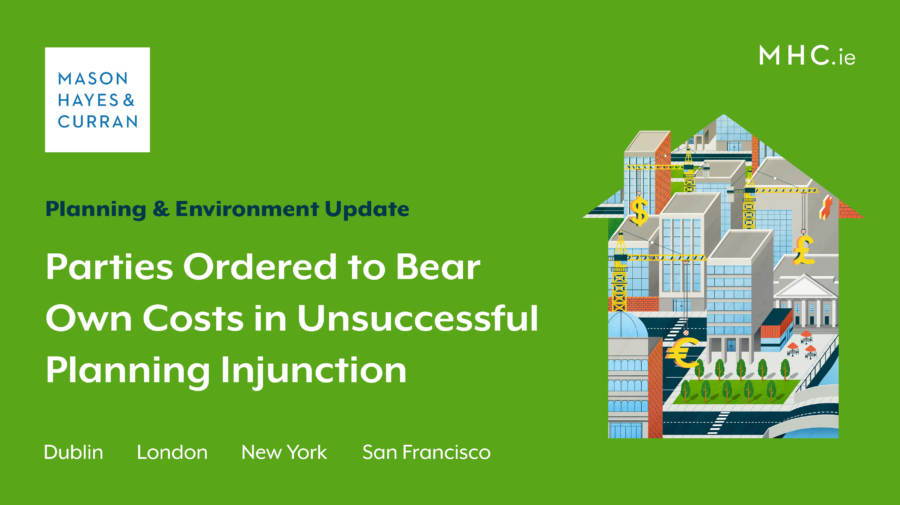
Our Planning & Environment team reviews the impact of a recent decision in which the parties to an unsuccessful planning injunction were ordered by the Court of Appeal to bear their own costs.
The Court of Appeal’s recent judgment in Diamrem Limited[1]
considered whether an applicant was entitled to costs protection. Cost protection was being sought by the applicant under section 3 of the 2011 Act even though it was unsuccessful in proceedings which it brought under section 160 of the Planning and Development Act 2000 (the PDA). A feature of the proceedings was that Diamrem had brought the proceedings with the aim of closing the local authority’s car park at the Cliffs of Moher Visitor Centre (the Visitor Centre) for its own commercial interests.
Section 160 proceedings
In the original High Court proceedings, Diamrem had sought various planning injunctions under section 160 of the PDA. It sought orders preventing the use of the car park at the Visitor Centre and requiring its removal on the basis that it is unauthorised development. Diamrem has a commercial interest in a separate privately-owned ‘park and ride’ business servicing the Visitor Centre. The High Court dismissed the proceedings on the basis that they were brought outside of the statutory time limit and this decision was upheld by the Court of Appeal.
In its first judgment dismissing the appeal, the Court of Appeal indicated its provisional view that costs should follow the event. The parties made submissions on the costs issue during which time several significant judgments on costs were delivered by the Superior Courts, not least the Supreme Court judgment in Heather Hill.[2]
Diamrem’s arguments
Diamrem argued that proceedings brought under section 160 of the PDA fall within the terms of section 4(1) of the Environment (Miscellaneous Provisions) Act 2011 and that therefore section 3 of the 2011 Act applies, which provides that both parties bear their own costs.
Section 4 of the 2011 Act specifies that section 3 applies to civil proceedings brought for the purpose of ensuring compliance with, or the enforcement of, planning permission where the failure to ensure compliance with the permission:
- has caused
- is causing, or
- is likely to cause
damage to the environment.
Diamrem submitted that its section 160 proceedings come within section 4 of the 2011 Act because their purpose was to ensure the local authority was compliant with the statutory requirement to have planning permission for its car park. It introduced an expert report into evidence in the High Court. The report showed that there is a causative link between the car park and damage being caused to the environment. The environmental damage was reported to be the loss of foraging ground for Chough, a bird species protected by the Cliffs of Moher SPA.
Diamrem relied on previous High Court decisions to argue that the fact that the 2011 Act did not feature in the section 160 proceedings until the costs stage was not a bar to it relying on the 2011 Act.
Clare County Council’s arguments
Clare County Council contested the application of the 2011 Act to the section 160 proceedings. It relied on various arguments, however, its main argument seems to have been the contention that Diamrem did not bring the section 160 proceedings for environmental reasons. Rather, it contended that Diamrem was driven by commercial reasons. It argued that sections 3 and 4 of the 2011 Act can only apply where environmental reasons were the real reason for the proceedings having been brought, and not where proceedings are brought for the purpose of achieving some collateral or irrelevant purpose. The Council cited a number of High Court decisions in support of this argument.
In response, Diamrem argued that the fact that the public interest (in this case, environmental issues) and Diamrem’s own commercial interests are both engaged does not preclude the proceedings from the scope of section 4 of the 2011 Act.
Following delivery of the Supreme Court’s decision in Heather Hill, the parties made further submissions. The Council argued the decision in Heather Hill requires that costs not be prohibitively expensive rather than each party having to bear their own costs.
Decision
The Court of Appeal considered the potential difficulty with section 4(1)(a) of the 2011 Act in that a party may bring section 160 proceedings for more than one purpose or reason. Woulfe J observed that the narrow purpose of section 160 proceedings is that they are to ensure compliance with the statutory requirement to obtain planning permission. However, he noted they may also be brought for a wider purpose in the sense that a person’s overall reason, or underlying motivation, for initiating proceedings may be to try to stop a development for commercial reasons.
Having considered the reliefs sought by Diamrem in the section 160 proceedings and the contents of the documents filed in those proceedings, Woulfe J refused to consider what Diamrem’s underlying motivation might be. He held it was a matter of reality and substance that they were brought for the purpose of ensuring compliance with the statutory requirement that the respondents obtain planning permission for their car park. As such, he held that the proceedings come within the scope of section 4(1)(a) and 4(1)(b) of the 2011 Act.
Regarding whether Diamrem had met the requirement that some damage was being caused to the environment by the car park, Woulfe J considered the test required by section 4(1) of the 2011 Act is that the applicant must go beyond mere assertions of damage or likely damage to the environment and to make out a stateable argument that damage to the environment is occurring or is likely to occur. In this regard, Woulfe J preferred a broad approach to the question of damage as including “any adverse effect on any matter” specified in section 4(2) of the 2011 Act. By reference to Diamrem’s expert report, Woulfe J was satisfied that Diamrem had met this test, which he described as a “low bar”.
Accordingly, the Court held that sections 3 and 4 of the 2011 Act apply to the section 160 proceedings and each party shall bear its own costs of the appeal. However, regarding the costs of the submissions on the costs issue, the Court ordered the respondents to pay Diamrem’s costs on the basis that it was entirely successful on the costs issue.
Comment
This Court of Appeal decision is a reminder to developers that unsuccessful applicants in planning injunction cases may still be entitled to costs protection provided they meet the requirements of section 4 of the 2011 Act.
For more information and expert advice, contact a member of our Planning & Environment team.
The content of this article is provided for information purposes only and does not constitute legal or other advice.
[1] Diamrem Limited v Cliffs of Moher Visitor Centre Limited and Clare County Council [2023] IECA 235
[2] Heather Hill Management Company CLG and McGoldrick v An Bord Pleanála, Burkeway Homes Limited and the Attorney General [2022] IESC 43
Share this:





